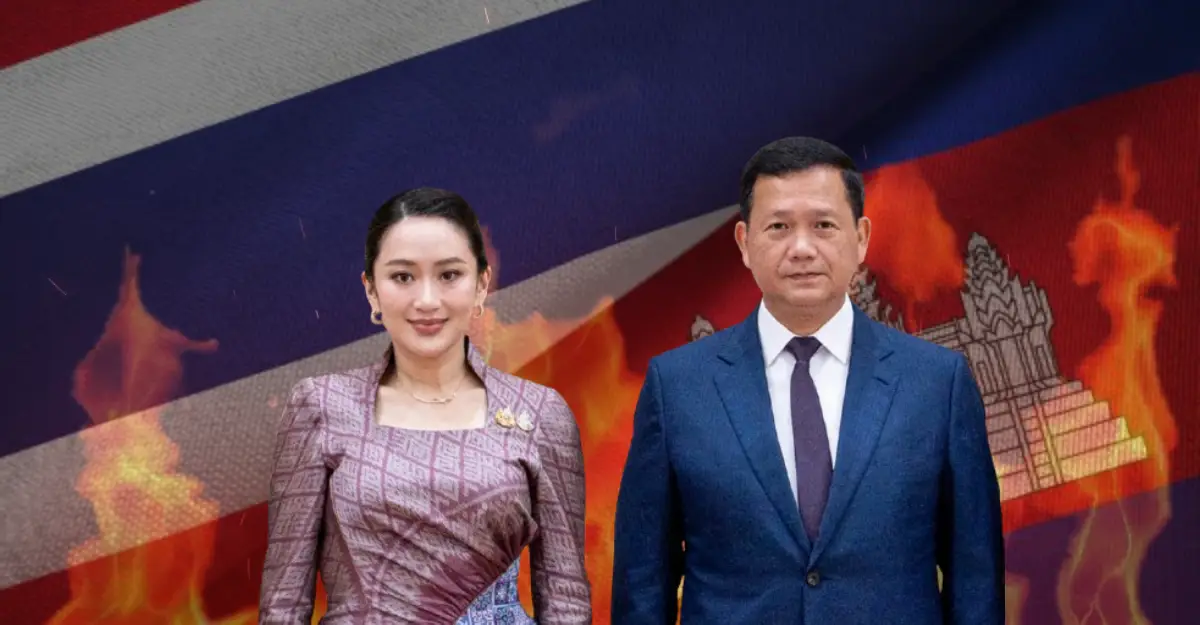Cambodia has embarked on a significant legal endeavor to settle long-standing border disputes with Thailand, marked by the inaugural meeting of its Commission for the Preparation of Documents for Submission to the International Court of Justice (ICJ). Held on June 23, 2025, in Phnom Penh, this meeting signals Cambodia’s determination to pursue a resolution through peaceful, judicial means over contested territories, including the Mom Bei area and the Tamoan Thom, Tamoan Tauch, and Ta Krabei temples.
Chaired by Minister of Foreign Affairs and International Cooperation Prak Sokhonn, the session laid the groundwork for a coordinated legal and diplomatic strategy. With tensions over border demarcations persisting for decades, Cambodia’s move to engage the ICJ—a principal judicial organ of the United Nations—underscores a commitment to international law amid complex regional dynamics. As both nations navigate historical claims and modern geopolitical interests, the outcome of this case could set a precedent for dispute resolution in Southeast Asia.
Strategic Planning and Division of Responsibilities
The June 23 meeting was a pivotal step following the establishment of the Commission on June 6, 2025, and Cambodia’s official notification to the ICJ on June 15. Key outcomes included the creation of a strategic work plan and the delineation of roles between two core working groups: Legal Affairs and Diplomatic Affairs. These groups are tasked with distinct yet complementary functions to ensure a robust presentation of Cambodia’s case before the international court.
The Legal Affairs Working Group will focus on the technical aspects of the case, including the selection of international legal experts, the preparation and review of critical documents, and coordination with foreign lawyers. Their work is central to crafting a compelling legal argument that addresses the historical and territorial intricacies of the disputed areas. Meanwhile, the Diplomatic Affairs Working Group will manage communications with the ICJ and support the legal process through diplomatic channels, ensuring that Cambodia’s position is clearly articulated on the global stage.
A statement from the Cambodian Foreign Ministry outlined the Commission’s primary duties, emphasizing a collaborative approach. “The main duties of the commission include: 1) to select international lawyers upon the recommendation of the Legal Affairs Group; 2) to examine and approve documents prepared by the Legal Affairs Group in collaboration with the international lawyers for submission to the ICJ” said a ministry spokesperson. This structured division of labor aims to streamline efforts and enhance the effectiveness of Cambodia’s legal push.
Historical Context of the Cambodia-Thailand Border Dispute
The border dispute between Cambodia and Thailand dates back to colonial-era demarcations, with overlapping claims rooted in historical treaties and differing interpretations of maps. The areas in contention, including the Mom Bei region and several ancient temples, hold significant cultural and national importance for both countries. Tamoan Thom, Tamoan Tauch, and Ta Krabei, located near the border, are not only historical landmarks but also symbols of national identity, making their status a deeply emotive issue.
Previous attempts to resolve the dispute have included bilateral negotiations and regional mediation, notably through the Association of Southeast Asian Nations (ASEAN). However, these efforts have often been hampered by domestic political pressures and mutual distrust. A notable escalation occurred in 2011, when skirmishes near the Preah Vihear Temple—another contested site previously adjudicated by the ICJ in 1962—resulted in casualties on both sides. While that ruling favored Cambodia, ambiguities in border demarcation persisted, fueling ongoing tensions.
Cambodia’s current approach builds on the precedent set by the 1962 case, seeking a definitive ICJ ruling to clarify ownership and prevent further conflict. By engaging international legal mechanisms, Phnom Penh hopes to depoliticize the issue and achieve a resolution grounded in law rather than military or diplomatic posturing. Yet, the process is not without challenges, as Thailand has historically been cautious about international adjudication over sovereignty issues.
Legal and Diplomatic Implications
The decision to take the dispute to the ICJ carries significant implications for Cambodia, Thailand, and the broader Southeast Asian region. For Cambodia, a favorable ruling could affirm its territorial claims and strengthen its position in future negotiations with neighbors. However, the process is lengthy and complex, often spanning years from initial submission to final judgment. During this period, maintaining diplomatic relations with Thailand will be crucial to avoid escalation on the ground.
Thailand, which has not yet publicly responded to Cambodia’s latest move, faces a delicate balancing act. Accepting ICJ jurisdiction could be seen as a commitment to peaceful resolution, but it may also provoke domestic backlash if the ruling is perceived as unfavorable. Thai authorities have, in recent months, tightened border controls and cracked down on cross-border issues, as evidenced by the temporary closure of the Thai-Cambodian border to non-humanitarian crossings. While unrelated to the ICJ case directly, such actions reflect heightened sensitivities in bilateral relations.
Regionally, the case could influence how other ASEAN member states address territorial disputes. With overlapping maritime claims in the South China Sea and land border issues elsewhere, the outcome may encourage or deter recourse to international courts. Analysts suggest that a successful resolution through the ICJ could bolster confidence in legal mechanisms, though failure to implement rulings—should either party resist—might undermine such faith.
Domestic and International Reactions
Within Cambodia, the government has framed the ICJ initiative as a demonstration of its commitment to sovereignty and peaceful conflict resolution. Public sentiment, often shaped by historical grievances against Thailand, appears cautiously supportive, though there is limited awareness of the legal intricacies involved. In rural border communities, where skirmishes have disrupted lives in the past, there is hope that a judicial outcome will bring lasting stability, though skepticism about enforcement remains.
Internationally, Cambodia’s move has drawn attention from legal scholars and regional observers. Posts on social media platforms like X indicate a mix of optimism and concern, with some users praising the pursuit of justice and others warning of potential diplomatic fallout. “Cambodia’s ICJ filing is a bold step, but Thailand’s response will be key to avoiding renewed tensions” noted one prominent commentator. While such sentiments are not authoritative, they reflect the broader stakes at play.
The involvement of international lawyers and the ICJ’s global mandate also ensure that the case will be closely watched beyond Southeast Asia. For small and medium-sized nations, Cambodia’s approach may serve as a model—or a cautionary tale—about leveraging international law to address disputes with more powerful neighbors. Ensuring transparency and adherence to legal norms will be critical to maintaining credibility throughout the process.
Challenges Ahead for Cambodia’s Legal Strategy
Despite the structured approach outlined during the June 23 meeting, Cambodia faces several hurdles in its ICJ endeavor. Compiling a watertight legal case requires meticulous historical research, cartographic evidence, and expert testimony, all of which demand significant resources and coordination. The selection of international lawyers, a priority for the Legal Affairs Working Group, will be particularly crucial, as their expertise could sway the court’s interpretation of complex evidence.
Moreover, the diplomatic dimension cannot be understated. While the Diplomatic Affairs Working Group is tasked with managing ICJ communications, it must also navigate Thailand’s response and potential counterclaims. If Thailand contests jurisdiction or files a parallel case, the proceedings could become more protracted and contentious. Cambodia’s foreign ministry will need to balance assertive legal advocacy with efforts to prevent bilateral relations from deteriorating further.
Financially, the costs of pursuing an ICJ case are substantial, though exact figures remain undisclosed. Legal fees, expert consultations, and administrative expenses could strain national budgets, particularly for a developing economy like Cambodia. While no specific funding allocations were mentioned in the meeting outcomes, securing sustainable resources will be essential for the Commission to fulfill its mandate over the coming years.
A Path to Peaceful Resolution?
As Cambodia presses forward with its ICJ case, the inaugural meeting of the Commission marks a critical juncture in a decades-long saga. By establishing clear legal and diplomatic frameworks, Phnom Penh is signaling its intent to resolve the border dispute through established international norms rather than confrontation. Yet, the road ahead is fraught with legal complexities, diplomatic sensitivities, and domestic expectations that will test the resilience of this strategy.
For now, the focus remains on preparation and coordination, with the Commission’s working groups tasked with translating plans into actionable steps. As documents are drafted and international experts are brought on board, the eyes of the region—and the world—will be on how Cambodia and Thailand navigate this high-stakes legal battle. Whether the ICJ process ultimately fosters peace or fuels further discord remains an open question, one that will shape the future of bilateral ties and regional stability in Southeast Asia.
















